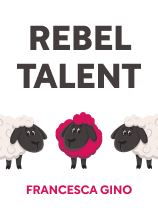

This article is an excerpt from the Shortform book guide to "Rebel Talent" by Francesca Gino. Shortform has the world's best summaries and analyses of books you should be reading.
Like this article? Sign up for a free trial here.
What is Francesca Gino’s book Rebel Talent about? What are the main takeaways of the book?
In Rebel Talent, Francesca Gino argues that no matter who you are, you can push yourself out of your comfort zone. You can also live a more productive and fulfilling life by tapping into your constructive inner rule breaker.
Read below for a brief overview of the book Rebel Talent.
Rebel Talent by Francesca Gino
In her book Rebel Talent, Francesca Gino identifies five key elements embodied by innovators who have broken free of society’s well-worn ideas, traditions, and norms to make transformative change. Gino says that, together, these elements compose “rebel talent,” a quality of people who break the rules in a constructive way.
We often think of rebels as troublemakers or contrarians, but Gino says that constructive rule breakers are outside-the-box thinkers who necessarily push boundaries in order to exploit their creative talents to the fullest and innovate in ways that make meaningful change in society.
Gino contends that stepping outside your comfort zone and freeing yourself of rules and norms that stifle your creativity and individuality can lead to greater happiness and success, both at work and in your personal life.
Gino is a Harvard Business School professor who researches the choices people make at work and ways business leaders and employees can improve their professional lives. Fifteen years of studying businesses and talking with people in a range of settings and professions led Gino to pen Rebel Talent in 2018, in which she profiles talented standouts who have broken the rules productively in order to innovate.
First, we’ll examine the five key elements of “rebel talent” and why you should embrace each one:
- Rebels try new things.
- Rebels ask questions.
- Rebels work to expand their base of knowledge.
- Rebels resist categorization and stereotypes.
- Rebels show their true selves to the world.
Gino asserts that these five elements together promote engagement, which is the key to living a rich and fulfilling life at work and home. When you fail to tap into all the elements, you experience the opposite state—disinterest—which stifles creativity, performance, and innovation. Gino says rebels fight against the boredom that comes with a life too scripted, and they embrace the uncertainty, tension, and conflict inherent in stepping out of their comfort zone and becoming truly engaged.
Rebels: Loved by Some, Loathed by Others
Content creator and rebel Jay Shetty builds on Gino’s notion of rebels as rule breakers with an additional trait: A willingness to self-reflect. Shetty argues that rebels continually ask themselves, “Am I living the life I want to live?” to ensure that they’re on course, as opposed to simply accepting things as they are.
But not everyone’s on board with Gino’s positive assessment of rebels. While Gino argues that being a constructive rebel can bring you greater success and happiness at work and home, being unconstructive can negatively impact everyone else. Here are some things to keep in mind about others’ perspectives of rebels:
- Rebels in the workplace may be viewed as a costly, time-sucking, energy-wasting “problem to be managed,” and characterized as pot-stirrers, gripers, and negative attention seekers who prioritize being “right” over being happy.
Rebels may leave a negative impression outside of work as well. In The Four Tendencies, Gretchen Rubin disagrees with Gino’s assertion that anyone can become a rebel, arguing that rebels are born, not made. In fact, she says it’s rebels’ very intractableness that makes them so annoying, because they refuse to “grow up” or “grow out of it,” no matter how much you may want them to. Less desirable rebel attributes that Rubin cites include that they’re uncooperative, inconsiderate, restless, live like they’re immune to rules, don’t care about their reputation, and resist doing things that others ask them to do—all of which can make getting along with them challenging.
Part 1: The 5 Elements of Rebel Talent
As we previously explained, being a rebel is about breaking the rules constructively so you can unleash your creative talents, innovate, and live a fully engaged life. In this section, we’ll examine the five elements that drive rebel success.
Element 1: Rebels Try New Things
Gino explains that the first way rebels break the rules is by embracing new ideas and experiences. Rebels step outside their comfort zone to try things they haven’t done before because they know that it’s the best way to test their limits and that learning about themselves, their capacity, and their potential leads to growth.
Element 2: Rebels Ask Questions
The second way rebels break the rules is by always asking questions. Gino says rebels constantly ask questions and gather information to better understand and connect to the people around them, tap into their creativity, and innovate.
Element 3: Rebels Work to Expand Their Base of Knowledge
The third way rebels break the rules is by seeking out knowledge wherever and whenever they can. According to Gino, rebels walk into every experience, new and old, with the goal of learning something from it, building on their existing knowledge base, and preventing blindspots that would limit their ability to realize their greatest potential.
Element 4: Rebels Fight Categorization and Stereotypes
The fourth way rebels break the rules is by rejecting labels assigned by others and embracing different viewpoints. Gino notes that rebels refuse to be limited by others’ definitions of them because they understand that people’s greatest potential and strength lies in their individuality, and that bringing unique voices and perspectives into conversations leads to innovation.
Element 5: Rebels Show Their True Selves to the World
The fifth way rebels break the rules is by being open about who they are and the challenges they face, even when they know they’ll face backlash for bucking social norms. Rebels say, “This is who I am, in all my imperfect glory,” because they understand the power of vulnerability to connect them with other people, and they know they bring their greatest strengths to the table when they are truly being themselves.
Part 2: The Principles of Rebel Leadership
Gino says that rebel leadership is for everyone, not just leaders with a staff. Being a rebel leader involves adopting a mindset and way of functioning that centers on challenging the status quo in pursuit of your goals, and then helping others do the same—even when the road to reach those goals is bumpy. As is true with rebel talent, the benefit of rebel leadership is the potential it offers for innovation and transformative change.
Gino lays out eight principles necessary to become a rebel leader, five of which closely mirror the rebel talent elements she explores in the first part of her book. To limit redundancy, this section will review the three principles of rebel leadership Gino explores that don’t overlap with the five previously discussed rebel talent elements.

———End of Preview———
Like what you just read? Read the rest of the world's best book summary and analysis of Francesca Gino's "Rebel Talent" at Shortform.
Here's what you'll find in our full Rebel Talent summary:
- Why you should tap into your inner rule breaker
- A guide on how to break the rules constructively
- The three principles for becoming a rebel leader






